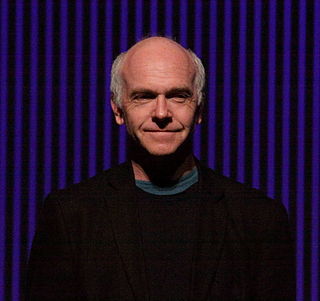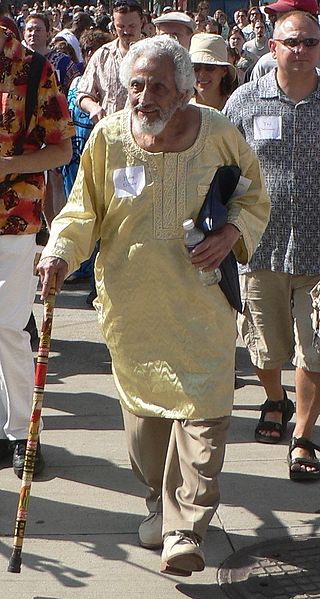Related Research Articles
"World music" is an English phrase for styles of music from non-Western countries, including quasi-traditional, intercultural, and traditional music. World music's broad nature and elasticity as a musical category pose obstacles to a universal definition, but its ethic of interest in the culturally exotic is encapsulated in Roots magazine's description of the genre as "local music from out there".

Ambient music is a genre of music that emphasizes tone and atmosphere over traditional musical structure or rhythm. It may lack net composition, beat, or structured melody. It uses textural layers of sound that can reward both passive and active listening and encourage a sense of calm or contemplation. The genre is said to evoke an "atmospheric", "visual", or "unobtrusive" quality. Nature soundscapes may be included, and the sounds of acoustic instruments such as the piano, strings and flute may be emulated through a synthesizer.
Freetekno is a cultural movement that is present in Europe, Australia and North America. Freetekno sound systems or tribes form in loose collectives, frequently with anarchist philosophies. These sound systems join to hold parties wherever a viable space can be found – typical locations include warehouses, fields, abandoned buildings or forests. Because freetekno parties are usually held illegally this sometimes leads to clashes with the police, as was the case at both the 2004 and 2005 Czechtek festivals and many other, smaller parties around the world at different times.
Electronica is both a broad group of electronic-based music styles intended for listening rather than strictly for dancing and a music scene that came to prominence in the early 1990s in the United Kingdom. In the United States, the term is mostly used to refer to electronic music generally.

John Oswald is a Canadian composer, saxophonist, media artist and dancer. His best known project is Plunderphonics, the practice of making new music out of previously existing recordings.
Nu jazz is a genre of jazz and electronic music. The music blends jazz elements with other musical styles, such as funk, electronic music, and free improvisation.

The highly diverse and distinctive music of Madagascar has been shaped by the musical traditions of Southeast Asia, Africa, Oceania, Arabia, England, France and the United States over time as indigenous people, immigrants, and colonists have made the island their home. Traditional instruments reflect these widespread origins: the mandoliny and kabosy owe their existence to the introduction of the guitar by early Arab or European seafarers, the ubiquitous djembe originated in mainland Africa and the valiha—the bamboo tube zither considered the national instrument of Madagascar—directly evolved from an earlier form of zither carried with the first Austronesian settlers on their outrigger canoes.
Oscar Lopez is a Chilean-Canadian guitarist, whose signature style blends Latin and jazz styles.

Halim Abdul Messieh El-Dabh was an Egyptian-American composer, musician, ethnomusicologist, and educator, who had a career spanning six decades. He is particularly known as an early pioneer of electronic music. In 1944 he composed one of the earliest known works of tape music, or musique concrète. From the late 1950s to early 1960s he produced influential work at the Columbia-Princeton Electronic Music Center.

Space music, also called spacemusic or space ambient, is a subgenre of new-age music and is described as "tranquil, hypnotic and moving". It is derived from ambient music and is associated with lounge music, easy listening, and elevator music.
Celtic fusion is an umbrella term for any modern music which incorporates influences considered "Celtic", or Celtic music which incorporates modern music. It is a syncretic musical tradition which borrows freely from the perceived "Celtic" musical traditions of all the Celtic nations, as well as from all styles of popular music, it is thus sometimes associated with the Pan-Celtic movement. Celtic fusion may or may not include authentic traditional music from any one tradition under the Celtic umbrella, but its common characteristic is the inspiration by Celtic identity.
Marjan Mozetich is a Canadian composer who has written music for theatre, film and dance, as well as many symphonic works, chamber music, and solo pieces. He has written compulsory competition pieces for the 1992 Banff String Quartet Competition and the 1995 Montreal International Music Competition. Co-founder of Arraymusic in Toronto, Mozetich served as their artistic director from 1976 to 1978. After his work with Array, he worked for some time at the University of Toronto music library, and then became a freelance composer. Mozetich moved to Howe Island, near Kingston, Ontario, and taught composition at Queen's University in Kingston from 1991 to 2010. He has won several awards, including the first prize in the CAPAC (SOCAN)-Sir Ernest MacMillan Award. His major compositions include Fantasia... sul linguaggio perduto, and Postcards from the Sky.
Hennie Bekker is a Zambian-born composer, arranger, producer and keyboardist based in Toronto, Ontario, Canada. His work includes jazz fusion, film scoring, new-age and techno. Bekker won a Juno Award for his work with techno-driven trio BKS.

Latent Anxiety is an American electronic alternative rock solo music project with crossover abilities from Los Angeles, California, United States founded in 2001 by the music producer, songwriter and musician Ilja Rosendahl who is also known as a film producer, director, screenwriter, actor and voiceover artist.

The Dewarists is a musical television series on MTV India. The series is part music documentary and part travelogue. The show casts musicians from various parts of the world, collaborating to create original music while travelling across India. The first season featured a total of ten episodes. It featured many musicians, including Imogen Heap, Vishal–Shekhar, Zeb and Haniya, Shantanu Moitra, Swanand Kirkire, Indian Ocean, Mohit Chauhan, Parikrama, Agnee, Shilpa Rao, Shri, Monica Dogra, Rajasthan Roots, Papon, Rabbi Shergill, Shubha Mudgal, Swarathma, MIDIval Punditz, Humble the Poet, Karsh Kale, Baiju Dharmajan, Njeralathu Harigovindan, Raghu Dixit and Rewben Mashangva.
Sampledelia is sample-based music that uses samplers or similar technology to expand upon the recording methods of 1960s psychedelia. Sampledelia features "disorienting, perception-warping" manipulations of audio samples or found sounds via techniques such as chopping, looping or stretching. Sampladelic techniques have been applied prominently in styles of electronic music and hip hop, such as trip hop, jungle, post-rock, and plunderphonics.
Henry Vega is a composer and Electroacoustic musician from New York City, currently living in The Hague, Netherlands. He founded The Spycollective in 2006, a now defunct music, theater and dance group, and is a founding director of Artek Foundation. Vega has been composing and performing internationally since 2001 and is also a founding member of The Electronic Hammer trio with Diego Espinosa and Juan Parra Cancino. He is married to Polish composer Kasia Glowicka.
Cris Derksen is a two-spirit Juno Award–nominated Cree cellist from Northern Alberta, Canada. Derksen is known for her unique musical sound which blends classical music with traditional Indigenous music. Her music is often described as "electronic cello" or classical traditional fusion.

Chloé Herry, known professionally as CloZee, is a French musician, DJ, and record producer. She is celebrated for her blend of UK bass, glitch, dubstep, trap, and world music influences.
References
- ↑ Karen Bliss (Spring 2007). "Faces to Watch: Adham Shaikh". Words & Music.
- ↑ "Juno Awards Database". junoawards database. Canadian Academy of Recording Arts and Sciences . Retrieved 9 April 2011.
- ↑ Terry Brennan (12 July 2007). "KCR's Deconstructing Dinner collaborates with Adham Shaikh on feature broadcast". Nelson Daily News.
- ↑ Darren Davidson (3 April 2006). "Local Juno bid comes up short, but sweet: Adham Shaikh: Bonnington music maker says beyond career boost and learning experience, greatest reward of Juno nomination has been Nelson's support". Nelson Daily News.
- ↑ "Extended Clone Dance Party". BBC America. 21 June 2014. Retrieved 16 July 2015.